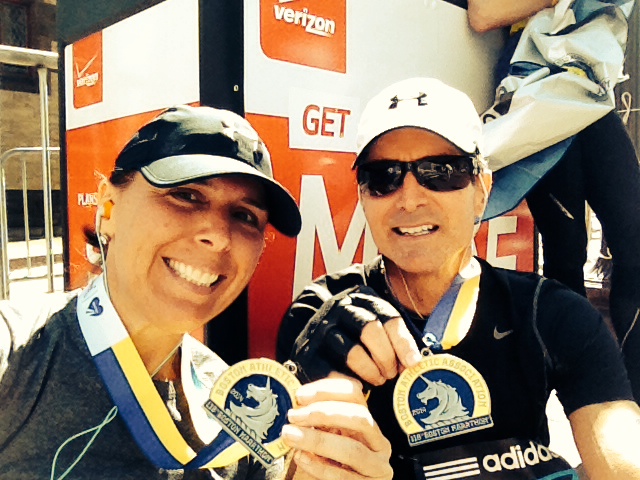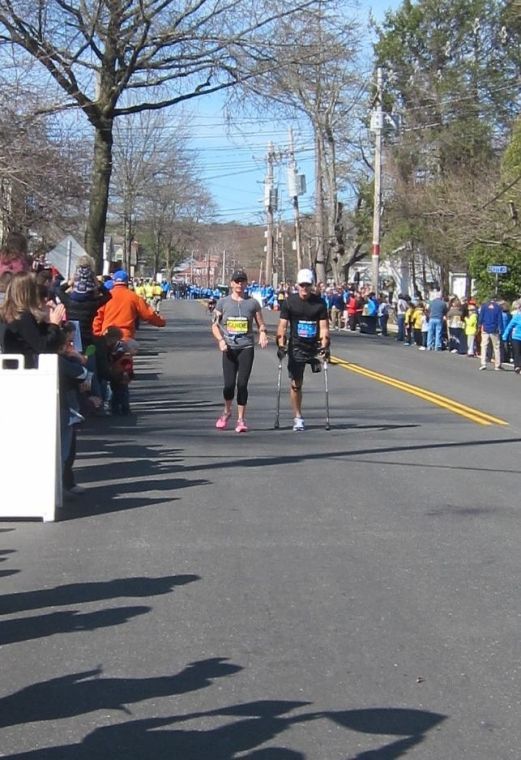Early Monday morning, Larry Chloupek tightened the laces on his blue size 10.5 Brooks running shoe. Just his right one.
Chloupek, who lost his left leg to bone cancer at age 7, was one of about 36,000 runners to take on the 118th Boston Marathon. In the first Boston Marathon since two bombs exploded near the finish line at last year’s race, he was the only participant to finish using forearm crutches.
The three people who were killed and the 16 who became amputees in 2013 didn’t leave Chloupek’s mind throughout the 26.2-mile course. When the 53-year-old finally crossed the blue and yellow finish line, tears welled up in his eyes.
“Finishing the race and hearing the words, ‘I’ve completed a Boston Marathon,’ come from my mouth — that’s one of the most emotional things I’ve ever experienced,” said Chloupek, the management liaison director for the National Institutes of Health. “I’m very fortunate to have been able to run this year because it was so special.”
Chloupek, a lifelong resident of this state and Terrapins football and men’s basketball season ticket holder, cheers for the two Terps teams at every home game. But at the marathon, it was Chloupek’s turn to receive cheers of support.
He said when a person runs a marathon, he or she usually hits a wall in the final fifth of the race. That’s especially true for the Boston Marathon, where the infamous Heartbreak Hill comes at mile 21. When he ran on Monday, however, cheers from the crowd kept him far away from that mental and physical barrier.
“Those crowds just gave such a burst of support and excitement and adrenaline that it carried you to the finish line,” Chloupek said. “Having people stand up to salute you and applaud you — it’s really something else.”
The support didn’t come from just the crowds. Mobility-impaired runners, including Chloupek, began the race at 8:50 a.m., while the elite men started at 10 a.m. Eventually, the elite runners — some of whom, such as marathon winner Meb Keflezighi, have competed in the Olympics — began passing Chloupek.
When they did, they’d yell to Chloupek to stay strong and tell him he was their inspiration to keep going. Many participants patted him on the back as they ran by.
Chloupek finished the race in 5 hours and 20 minutes — 40 minutes faster than his goal and 17 minutes faster than his previous time at the Rock ’n’ Roll Marathon in Washington.
It was all those “Boston Strong” posters lining the route that quickened his pace, he said, and kept him at his desired pace of 12 minutes per mile.
Even before the marathon, Chloupek’s list of athletic achievements was longer than most people’s — with one leg or two. He has run eight half-marathons, played seated volleyball in the 1996 Atlanta Paralympics and completed more 5Ks than he can remember.
“I have a very competitive streak in me, so when someone tells me, ‘No, you can’t do it,’ I’m going to prove them wrong,” he said. “I like to be challenged.”
He decided to try a full marathon after he saw the joy on his wife Jenn’s face after she ran the Shamrock Marathon in Virginia Beach, Va., two years ago. He ran the Rock ‘n’ Roll Marathon in 2013, but not before saying it would be his first and last marathon.
“Because of the wear and tear on my body, I said I’d be one and done for a marathon,” he said.
But Chloupek said when he saw his time and realized it qualified him for Boston, he couldn’t pass it up, not after the events of 2013.
He wanted to show those who were wounded in the bombings they can move past their injuries.
“I try to lead by example and show people that life isn’t over when you’re an amputee,” Chloupek said. “Life can still go on. I was out there trying to prove a point that, despite a missing limb, you can do it. You can still lead a productive and meaningful life — even athletically.”
Chloupek has been working to spread that message since long before he started training for marathons. He’s been involved in Special Love, a nonprofit organization that provides families affected by cancer a network of support, for more than two decades.
“Larry is a living example of hope for cancer patients. We get numerous parents of children who are amputees that say meeting Larry really turned the tide in their child’s recovery,” said Dave Smith, Special Love CEO. “He showed them that they could not only survive but thrive, even as an amputee. If anyone was going to do the Boston Marathon as an amputee, it was going to be Larry.”
He’s also provided inspiration for students at this university.
Chloupek worked as an assistant baseball coach at Churchill High School in Potomac, his alma mater. There, he coached junior government and politics and history major Ben Kramer, instilling him with a “never give up” attitude.
“The biggest lesson Larry gave me was the lesson of keeping hardships in perspective,” Kramer wrote in a Facebook message. “Sometimes life can knock you down, but somehow Larry always knows how to get back up — and how to motivate others to do the same.”
Editing error: A previous version of this article incorrectly stated Chloupek worked as an assistant basketball coach. He was an assistant baseball coach. The article has been updated to reflect this change.
Larry Chloupek (right) ran in the Boston Marathon with his wife, Jenn. He was the only participant to complete the 2014 race with forearm crutches.
Larry Chloupek (right) runs in the Boston Marathon with his wife, Jenn. He was the only participant to complete this year’s race with forearm crutches.




